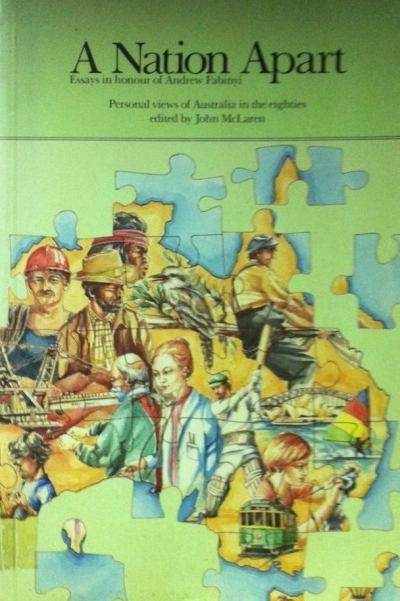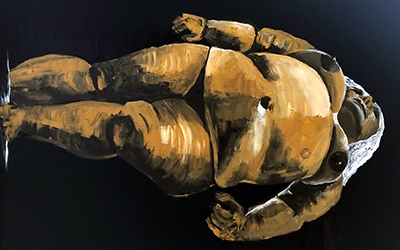Essay
In November 1984 when I left Queensland to come back to Victoria, Kathy de Bono, a friend from the Yoga school, followed me to Murwillumbah where I was catching the train. She told me that because my car was old she’d drive slowly behind me in case I broke down. Now my Lesley McGinley doesn’t look much, but it goes like the clappers. Out of mischief I flattened my foot when I’d crossed the Tweed, and Kathy soon became a speck in my rear vision mirror. When she reached Murwillumbah she said ‘I brought a packet of tissues in case you cried. Instead you’re all lit up and laughing.’
... (read more)Writing fiction is something I originally stumbled upon rather than consciously chose. Much the same can be said of my career as student and university teacher. Brought up in London in a lower working-class family, I certainly harboured no intellectual or literary ambitions. Like the rest of my family, I looked forward only to escaping from school as soon as possible and settling down to a steady job. What challenged that way of thinking was my parents’ unexpected decision to go to Northern Rhodesia (as it was then) when I was fifteen. Central Africa, where I was to spend a good portion of the next twenty years, did more to alter my attitudes and prospects than anything before or since. Still under British rule, it showed me the last and perhaps the ugliest face of colonialism; and in so doing destroyed any smug sense I may have had of my own Englishness. Equally, the politics of an emerging Zambia taught me some painful and abrupt lessons about both myself and the twentieth century preoccupation with violence.
... (read more)As the child of survivors of a war-battered, sorely depleted driftwood generation, I have acquired reasons in plenty to call myself lucky. Perhaps more, far more, than merely lucky.
... (read more)When I told a friend I was thinking of writing an essay on pre-Hispanic literature he said, ‘Forget it. You’d have to go to university to find out how to write an essay. Why don’t you write about your Christmas holidays?’ So perhaps it’s polite to warn readers that the following words, observations, and ideas are derived solely from personal experience, reading and reflection. I am a genuine lay person, shamelessly uneducated, having left school at fifteen and not found the time (or funds) to return since.
... (read more)I’m unrepresented but still resented. By the regular writers of the pulp I contribute to to keep me and mine from the pawnbrokers; by the witless screenwriters’ minders who know how to quote Lawson, but only in jest; by the rank & file plodders who hate the public, and most of all loathed by academics who have a sort of vision of blue collar, but mix it up w ...
Looking back over what I guess is my literary life (so hard to distinguish from the other that it’s a bit like leaving a forest and, in a clearing, trying to pick out the path among the trees!). I suppose I could lay claim to being one of the least disappointed or frustrated writers around the place. In part, this may be a tribute to my limited expectations which were nothing if not a reflection of a 1930s childhood when, if it was working-class and semi-itinerant, the philosophy one imbibed was not to ask too much. My brother who with my mother was the essential fountain from which I drew that sustenance which comes in the guise of folk wisdom, was fond of saying: ‘They (meaning whoever the authority-figure was) never put the roof on my lavatory!’ The sacred places were sacralised by a sense of independence which, now I come to think of it, depended upon what seems to me a very traditional Australian view not to expect too much whose lugubrious extreme is summed up in the national beatitude: Blessed is the pessimist, for he shall not be disappointed …
... (read more)So, my lad, you’ve got yourself born. It happens to all of us, and say what they will, those Deep-South Born-Again Americans, it is a-once-in-a-lifetime occurrence. One birth, one life, one death. You are fortunate; you have a good, a very good pair of parents, you have a strong body, and a questing mind. I had the same, a firm base from which to start out. I had ...
When I heard I was on a literary panel called ‘Dialogues with the Past’ I was struck by a very familiar feeling, well beyond déjà vu. The sort of feeling best described by Barry Humphries as having the anticipatory excitement of dancing with your mother. In this country, it seems, the Good Old Past is always trotted out for one more waltz.
There has to be a reason for our having a session called something like ‘Dialogues with the Past’ at every literary festival in Australia. What is it with us and history? We’re always being told we lack confidence in the here and now. How much do we still need the past, preferably the nineteenth century, to confirm for us who we are and why? Do we just think we do? We do seem to have – and I certainly include myself in this – an overriding concern with questions of national identity.
... (read more)Some people are diving with a whale shark off Stradbroke Island. I saw it on a news story on the internet. The whale shark is the largest known fish. It is extremely rare. It has never before been seen off the coast of Stradbroke Island. Something to do with La Niña, climate change, over-fishing, the tides. There is a rare fish off the coastline of my favourite island and a group of divers are swimming with it.
... (read more)

